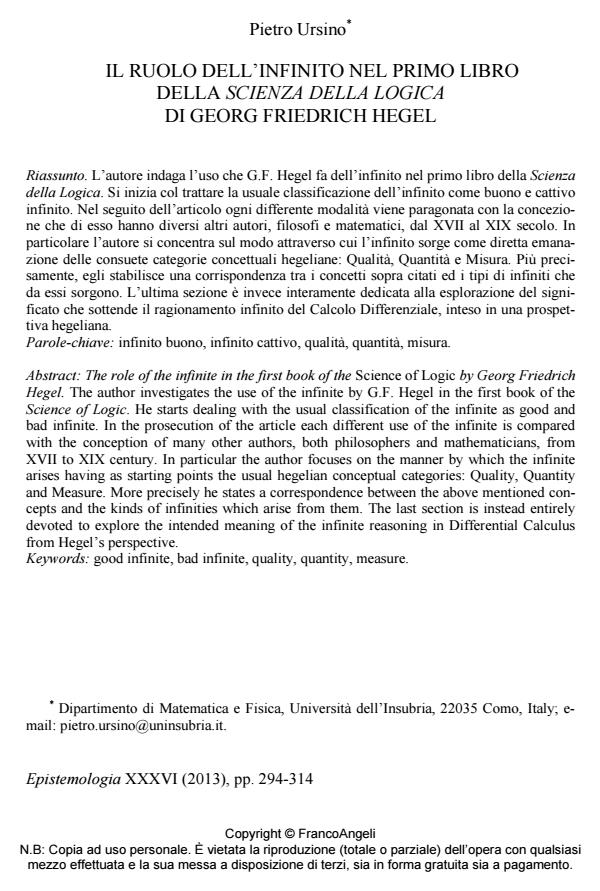The role of the infinite in the first book of the Science of Logic by Georg Friedrich Hegel
Journal title EPISTEMOLOGIA
Author/s Pietro Ursino
Publishing Year 2014 Issue 2013/2
Language Italian Pages 21 P. 294-314 File size 650 KB
DOI 10.3280/EPIS2013-002007
DOI is like a bar code for intellectual property: to have more infomation
click here
Below, you can see the article first page
If you want to buy this article in PDF format, you can do it, following the instructions to buy download credits

FrancoAngeli is member of Publishers International Linking Association, Inc (PILA), a not-for-profit association which run the CrossRef service enabling links to and from online scholarly content.
The author investigates the use of the infinite by G.F. Hegel in the first book of the Science of Logic. He starts dealing with the usual classification of the infinite as good and bad infinite. In the prosecution of the article each different use of the infinite is compared with the conception of many other authors, both philosophers and mathematicians, from XVII to XIX century. In particular the author focuses on the manner by which the infinite arises having as starting points the usual hegelian conceptual categories: Quality, Quantity and Measure. More precisely he states a correspondence between the above mentioned concepts and the kinds of infinities which arise from them. The last section is instead entirely devoted to explore the intended meaning of the infinite reasoning in Differential Calculus from Hegel’s perspective.
Keywords: Good infinite, bad infinite, quality, quantity, measure.
- Argyros S., Lopez A., Todorcevic S. (2005). A class of Banach spaces with few non-strictly singular operators, J. Funct. Anal., 2, pp. 306-384.
- Blay M. (1993). Les Raisons de l’infini, Paris, Gallimard.
- Bolzano B. (2003). I Paradossi dell’infinito, Torino, Silva Editore.
- Cohen P.J. (1973). La teoria degli Insiemi e l’ipotesi del continuo, Milano, Feltrinelli.
- L. Couturat (1973). De l’infini mathematique, Paris, Blanchard. Su web presso il sito gallica bibliotheque numerique: gallica.bnf.fr. Ultimo accesso: 7 maggio 2012.
- Dauben J.W. (1990). George Cantor, His Mathematics and Philosophy of the Infinite, Princeton, Princeton University Press.
- De Gandt F. (1992). Newton: la justification des infiniment petits et l’intuition du movement . In Monnoyeur F. (ed.) (1992), pp. 159-174.
- Hegel G.F. (1812-1816) Wissenschaft der Logik (2 voll.), Nürnberg. Johann Leonhard Schrag (trad. it. Scienza della Logica, Bari, Laterza, 2004; tr. fr. Science de la logique, la doctrine de l’ètre, Paris, Kime, 2007; si cita riferendosi a queste edizioni).
- Jech T. (1978). Set theory, New York, Academic Press.
- Kant I. (1781). Kritik der reinen Vernunft, Riga, Johann Friedrich Hartknoch (trad. it. Critica della ragion pura, Torino, Utet, 2005).
- Katz N.H., Laba I., Tao T. (2000). An improved bound on the Minkowski dimension of Besicovitch sets in R3, Annals of Mathematics 152(2), pp. 383-446.
- Klir G.J., Folger T.A. (1988). Fuzzy sets, uncertainty and information, Englewood (NJ), Prentice Hall.
- Lacroix A.(2000). The Mathematical Infinite in Hegel, The Philosophical Forum, 3-4, pp. 298-327.
- Monnoyeur F. (ed.) (1992). Infini des Mathematiciens, infini des Philosophes, Paris, Belin.
- Rogers C.A. (1988). Hausdorff Measures, Cambridge, Cambridge Mathematical Library.
- Röd W. (1992). Le problem de l’infini dans le développement de la pensée critique de Kant. In Monnoyeur F. (ed.) (1992), pp. 159-174.
- Szczeciniarz J.J. (1992). Le thème projectif: Desargues, l’infini à distance finie. In Monnoyeur F. (ed.) (1992), pp. 159-174.
- Sebestik J. (1992). Le paradoxe de la réflexivité des ensembles infinis: Leibniz, Goldbach, Bolzano. In Monnoyeur F. (ed.) (1992), pp. 175-194.
- Ursino P. (2005). A generalized small model property for languages which force the infinity, Le Matematiche, Vol. LX, Fasc. I, pp. 93-119.
Pietro Ursino, Il ruolo dell’infinito nel primo libro della scienza della logica di Georg Friedrich Hegel in "EPISTEMOLOGIA" 2/2013, pp 294-314, DOI: 10.3280/EPIS2013-002007